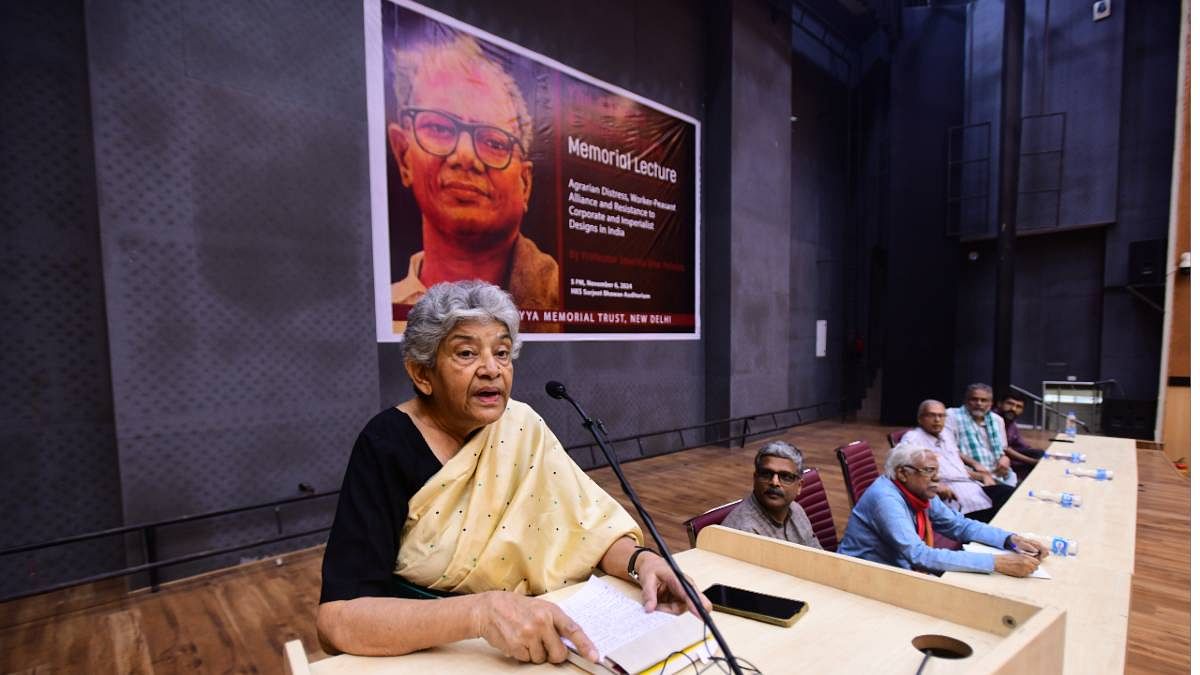New Delhi: India’s rural population has for long faced a decline in food and nutrition intake since the advent of neo-liberal policies in the early 1990s, says economist Utsa Patnaik, pointing out that at least 80 percent of rural Indians are having less than 2,200 calories per day.
“It (data) was downloaded by some people before it was completely withdrawn. The nutritional intake data are not there. But from whatever there is, through using certain approximations, I estimate that more than 80 percent of the rural population have slipped below 2,200 calories per day intake,” said Patnaik at the Second P Sundarayya Memorial Lecture on the topic ‘Agrarian Distress, Worker-Peasant Alliance and Resistance to Corporate and Imperialist Designs in India’ at HKS Surjeet Bhawan in New Delhi Wednesday.
Sundarayya was one of the pioneers of the peasant movement in India, a former Rajya Sabha MP and a founding member of the CPI(M).
Raising the issue of food distribution programmes in India, Patnaik criticised the reliability of current nutritional data and said that the central government’s claims of declining poverty in India are false.
The accepted average calorie requirement in India is 2,400 calories per day in rural areas and 2,100 calories in urban areas. “All the reliable data sources now have been completely undermined,” she said.
Wednesday’s lecture was organised by the P Sundarayya Memorial Trust, an independent organisation established in 2014. Managed by members of the All India Kisan Sabha, it aims to highlight agrarian issues in India.
The lecture was attended by students from different universities across New Delhi, including Jawaharlal Nehru University and Jamia Millia Islamia, academicians and workers from different farmer unions.
Also Read: Need for a rural workers union, said Prakash Karat at first P Sundarayya Memorial Lecture
Agrarian crisis under British
Going in-depth into the agrarian crisis in India, Patnaik said that British colonial rule led to a nearly 2 centuries-long exploitation which left Indian peasants and workers in a state of severe poverty and physical degradation by the time of independence in 1947.
Patnaik pointed to the British conquest of Bengal in 1765 as a key turning point.
She said that the British increased revenue demand on the region’s peasantry by four times in just five years, a policy that led to the catastrophic famine of 1770.
“This was not just a man-made famine, it was a British government-made famine,” Patnaik said, noting that around 10 million people—one-third of Bengal’s population—died due to the economic policies designed to maximise British profits.
Rather than relying on brute force, Patnaik argued, the British used sophisticated economic measures to extract resources from India, taxing Indian peasants and artisans who produced textiles and crops for export.
In reality, Patnaik explained, the goods they produced were “completely free” for Britain. The tax revenue that the peasants paid was used to fund the export system, meaning that the farmers effectively received no compensation for their work.
Patnaik further highlighted the economic consequences of British rule, which she described as operating on “surplus budgets” for almost 200 years. This led to unemployment and a significant decline in living standards, particularly in rural areas of India.
“The end result of this long period of exploitation of the peasantry and of labour in our country is that their standard of nutrition and their physical measures by the time of independence were much worse than that of people in even sub-Saharan Africa” Patnaik remarked.
The economist called it “genocide by economic means”, specifically pointing to the Bengal famine and the systemic exploitation that followed, which remains poorly understood.
‘Unfair terms, intellectual dishonesty’
Towards the end of her lecture, Patnaik said that there has been an “unrelenting attack” on developing countries like India as they have been asked to engage in the procurement and distribution of foodgrain.
She explained that under the World Trade Organization’s (WTO) agricultural agreements signed by India and several countries, “unfair terms” have been forced through discrepancies in policies and trade rules.
“The food security of their (developing countries) populations has been under tremendous attack for the last 20 years. And the attack is ongoing,” Patnaik said.
She explained that “advanced industrial countries want to have an international division of labour in which they sell their surplus foodgrains to us (India), since they have only one cropping season and they lack the opportunity to diversify in terms of crops”.
India, meanwhile, can produce everything that they produce, along with tropical and subtropical crops, she noted. “Global warming is going too slowly for Germany to be able to produce sugarcane very soon or for Canada to produce coffee,” she added.
Patnaik suggested that a research team should be put together to expose this “intellectual dishonesty”. “They will never stop. So you need a team of researchers who will actually expose these kinds of designs of the imperialists and also explain it to the ordinary people,” she said.
(Edited by Nida Fatima Siddiqui)
Also Read: ‘Ek tukda zameen se kya hoga’ — agrarian distress is stark in Sonipat, PM Kisan isn’t enough

